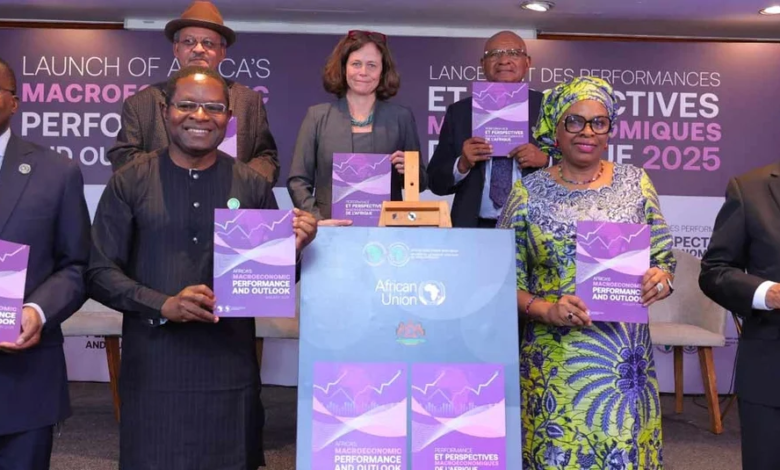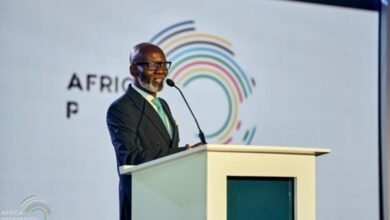African Development Bank 2025 Report : strengthening Africa’s economic growth amid global challenges
Africa's economy is expected to experience stronger growth in the coming years, despite global challenges. The 2025 report from the African Development Bank presents key forecasts and recommendations to strengthen resilience. Analysis.

The African Development Bank (AfDB) recently unveiled its 2025 Macroeconomic Performance and Outlook (MEO) report, providing insights into Africa’s economic trajectory despite persistent global challenges. Launched during the 38th ordinary session of the African Union Assembly in Addis Ababa, the report forecasts an acceleration of Africa’s real GDP growth to 4.1% in 2025, then to 4.4% in 2026, driven by economic reforms, declining inflation, and better fiscal and debt management.
An acceleration of Africa’s real GDP growth to 4.1% in 2025, then to 4.4% in 2026
However, despite these positive projections, the report notes that growth remains below the 7% threshold necessary for a significant reduction in poverty. According to the report, Africa’s growth is expected to remain moderate, with a forecast of 3.2% in 2024, a slight improvement from 2023 (3.0%).
Geopolitical tensions, climate-related disasters, and regional conflicts, particularly in the Sahel and the Horn of Africa, continue to pose major challenges. Furthermore, inflation remains a concern. Although it is expected to decrease, from 18.6% in 2024 to 12.6% between 2025 and 2026, it remains a major obstacle for African economies. The report also notes that fiscal deficits have slightly widened, rising from 4.4% of GDP in 2023 to 4.6% in 2024, although they are expected to decrease to 4.1% by 2025-2026.
Africa thus remains the second most dynamic region after Asia
Despite these challenges, Africa remains an economic hope. The report identifies 24 African countries, including Djibouti, Niger, Rwanda, Senegal, and South Sudan, as set to exceed 5% GDP growth in 2025. This strengthens the idea that Africa remains the second most dynamic region in the world after Asia, with 12 of the world’s 20 fastest-growing economies projected to be in Africa. These optimistic projections highlight the untapped potential of many African countries, despite persistent structural risks.
Ethiopia’s Minister of Finance, Ato Ahmed Shide, commented: « The report highlights the fragility of Africa’s economic growth, which is expected to remain around 4% in the short term. » He added that proactive policy measures are essential to maintaining stability and growth, particularly in a country like Ethiopia, where the government places a special emphasis on economic liberalization, empowering the private sector, and fiscal discipline.
As Africa navigates an increasingly complex economic landscape, policymakers must take a proactive approach to strengthen resilience and stimulate sustainable growth
The report also emphasizes the need for long-term measures. Nnenna Nwabufo, Vice President for Regional Development, Integration, and Service Delivery at AfDB, stressed: « As Africa navigates an increasingly complex economic landscape, policymakers must take a proactive approach to strengthen resilience and stimulate sustainable growth. » This statement highlights the importance of strategically managing global challenges to ensure long-term economic stability.
Professor Kevin Urama, Chief Economist at AfDB, further emphasized the need for better coordination between fiscal and monetary policies to control inflation while supporting growth. « It is crucial for African countries to strengthen their foreign exchange reserves to protect their economies from external shocks and currency depreciations, » he added. Moreover, an early debt restructuring could prevent defaults and ensure financial stability.
Strengthening regional integration and policy coordination
The report also addresses regional integration, highlighting the importance of strengthening continental initiatives such as the African Continental Free Trade Area (AfCFTA). Albert Muchanga, Commissioner for Trade at the African Union, stated that the African private sector must take a more active role in supporting AfCFTA. He specified: « What I expect from the African private sector is to create logistics centers and warehouses across Africa… We have enormous potential, but the private sector has not yet responded. »
The AfDB report recommends specific actions to foster long-term growth and resilience. Early debt restructuring, investments in integrated infrastructure, and the implementation of regulatory reforms aimed at improving the business environment are priorities to stimulate economic diversification and attract more private investment.
Key recommendations from the 2025 MEO report:
- Early debt restructuring to improve financial stability
- Investments in integrated infrastructure to foster economic diversification
- Improving the business environment through regulatory reforms and investment strategies
The AfDB report, published bi-annually, addresses the essential need for updated economic data in the face of global uncertainty. It serves as a resource for policymakers, development partners, global investors, and researchers.
Consult the report : 2025 Macroeconomic Performance and Outlook (MEO)






